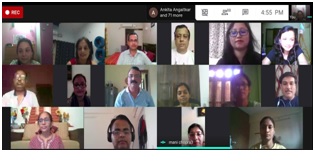A five-day Faculty Development Program on “E-Content Development and Delivery” sponsored by TEQIP-III was organized by Dibrugarh University Institute of Engineering and Technology (DUIET) and Dr. S.S. Bhatnagar University Institute of Chemical Engineering and Technology, Punjab University, Chandigarh during 19-23 August 2020 under TEQIP III project. Prof. Anupama Sharma, Professor, Dr. SSBUICET, Panjab University, and Mrs. Parismita Gogoi, Assistant Professor, DUIET were the Coordinators of the FDP. Mr. Naveen Kumar Verma, Assistant Professor, DUIET, and Dr. Gaurav Rattan, Assistant Professor, Dr. SSBUICET, Panjab University were the Co-Coordinators who planned the event providing all necessary technical support for the smooth conduction of the workshop. The FDP was attended by 145 participants across the nation.
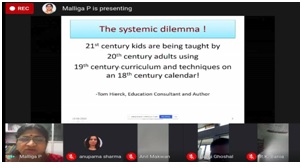
Prof. Pramathesh Bhattacharyya, Director, DUIET, Dibrugarh University, and FDP Chair Prof. Amrit Pal Toor, Project Head, TEQIP-III, Dr. SSBUICET, Panjab University were invited as the chief guests in the inaugural session on 19th August 2020, which was also graced faculty members of the DUIET. Dr. Gitalee Sharma, Nodal Officer Academic, TEQIP-III, DUIET welcomed the participants in her welcome speech. Mr. Kaushik Das, Coordinator TEQIP-III, DUIET detailed the objectives of the TEQIP-III project in his speech. Prof. Bhattacharyya welcomed the participants with a brief inaugural speech in which he described the various aspects of the event. Prof. Anupama Sharma, joint Coordinator from Dr. SSBUICET, Panjab University, in her inaugural remark, touched upon the importance of the subject “E-Content Development and Delivery”. The inaugural session was concluded after a Vote of thanks remark by Mrs. Parismita Gogoi, joint Coordinator from DUIET.
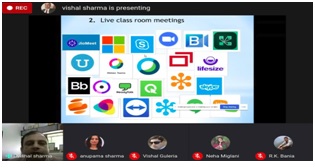
The FDP aimed at addressing the unprecedented challenges faced by educational systems worldwide due to the COVID-19 pandemic. The pandemic has led to the near-total closures of schools, universities, and colleges. The education sector needs to adapt fast so as to keep students motivated in their journey to learning. The motivation towards organizing this FDP was focused mainly on finding solutions to these challenges. The objectives of the event were mainly-
- To promote the generation of e-Content for all the subjects amongst faculty and research scholars.
- To understand the process of planning, designing, and implementation of online courses.
- To train the faculty and research scholars for the creation and delivery of e-content for formal and non-formal education with practical orientations.
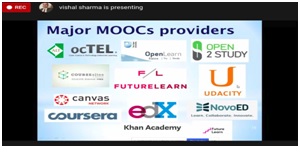
In the five days of the FDP, 15 sessions were delivered by eminent Academicians from IITs, NITTTRs, Central and State Universities of India on various aspects of the usage of technology in developing E-content for 21st-century learners. The first session on E-content development for online instruction was graced by Dr. P. Malliga, from Centre For Educational Media and Technology, NITTTR, Chennai. Prof. P. K. Bora, from the Department of Electronics and Electrical Engineering, IIT Guwahati delivered his talk on MOOCs development. Prof. Sunil Dutt, Head, Dept. of Education and Educational Mgmt., NITTTR, Chandigarh, expressed his views on developing Self-Learning Modules. Prof. Cynthia Menezes Prabhu, from Dept. of Management Studies, Bangalore University delivered a talk on using Social Media Platforms for online learning. Dr. Tejinder Pal Singh, from University Business School, Panjab University discussed Learning Management Systems and Student Engagement and Interactivity in Virtual Learning Environment in two sessions. Dr. Praveen Sharma, from MMU, Mullana demonstrated about Audio E-content development: Smart age-smart work. Dr. Jeesu Jaskanwar, University School of Open Learning, Panjab University demonstrated methods of Video Preparation and Editing for Online Teaching.
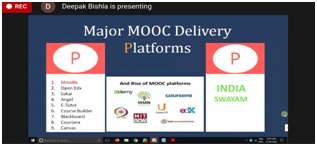
Dr. Deepak Bisla, System Administrator, from Dr. BR Ambedkar University elaborated on the Design, Development, and Delivery of MOOCs. Dr. Ramesh C. Sharma, from School of Global Affairs, Dr. BR Ambedkar University delivered his talk on Innovative Pedagogy of Online Teaching and Learning. Dr. Vishal Sharma, Coordinator, SWAYAM, Panjab University took up a session on Managing Online meeting Platforms and MOOCs through SWAYAM and other Digital Learning Platforms. Dr. Vikas Deep, from University School of Business Studies, Punjabi University elaborated on the topic of online presentation Etiquettes and Effectiveness. Dr. G. Janardhanan, Head Centre for Environment Management, NITTTR Chennai discussed on Blended and Flipped approach of Teaching in the last session of the FDP.
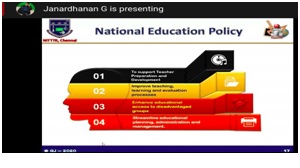
The speakers emphasized that the successful application of Newer pedagogical aspects in reaching out to the students is possible only through digital media when offline teaching has become impossible due to pandemic situations. The world has already experienced these changes in the last couple of years through MOOCs and Open Educational Resources (OER). The use of Virtual Reality in schools will likely increase in the coming years. Artificial intelligence (AI) will become one of the greatest technological innovations that will create a huge impact on the education sector. It will not only make learning effective for students but help teachers to perform their duties efficiently by adapting to changing environments and complexities.
